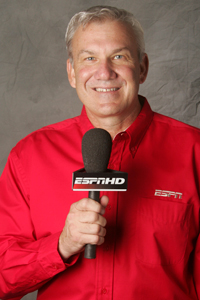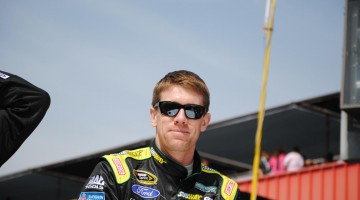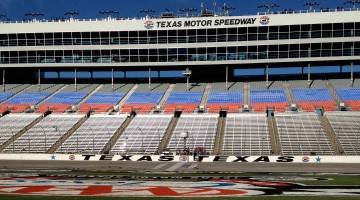 Okay, so last Tuesday, as if having a great time at the Pepsi 500 in Fontana wasn’t enough, I had the great pleasure of speaking with three-time Daytona 500 winner Dale Jarrett.
Okay, so last Tuesday, as if having a great time at the Pepsi 500 in Fontana wasn’t enough, I had the great pleasure of speaking with three-time Daytona 500 winner Dale Jarrett.
It wasn’t just a pleasure, it was a freaking honor to talk to this man. I’ve always liked him and I’ve always respected him as a driver. He’s a legend in NASCAR and if you told me a year ago that I would actually get the chance to talk to him I would have told you that you were crazy, but also that I liked your imagination.
So talking to him was fun and it was great to hear his opinion on the topics I brought up. He isn’t one to be closed up and cocky. He exudes niceness and this sort of regular Joe normalcy that I love. Plus he just talks, ya know? He doesn’t lead you around and give you nothing, he’s real.
So without further hubbub here’s the first of five posts devoted to my interview with the awesome Dale Jarrett.
—
Me: What has the transition been like from racing to being a sports analyst?
Jarrett: Really everything has gone pretty smooth from my side of it. The biggest thing has been going from competing to trying to learn a new vocation basically. That’s been my biggest challenge. But it hasn’t been to me that big of a challenge because of the people that ESPN has in place and that they’ve surrounded me with.
So, do I miss the competition side? Occasionally but not a lot because we’re still extremely busy in the broadcasting side of it and I’ve really enjoyed the new challenge of literally looking at the sport in a totally different way than what I did for over twenty years.
When I was driving a racecar I just had only one thing on my mind and it was making my racecar go as fast I possibly could and beating as much of the competition as I could. Didn’t really look at anything else going on around it. I certainly knew how the sport was progressing and growing and things that were happening in it, but now I find myself, and literally need to, keep up with everything that’s happening in the sport. I used to not really be that concerned with news and notes and what other people were doing and things like that. But that’s what my life’s about now, so it’s been a fun transition and I’ve really enjoyed it. I like going to races, the people that I work with and so it’s actually made it a lot of fun.
Me: Has it made you look at drivers in a new way since you’ve become a member of the media?
Jarrett: It does make me look at it a lot differently and appreciate for what a lot of them go through, and looking back on it how I might have been a little more cooperative at times with the media because I’m on that side now.
But I also have the understanding of, I think, what they’re going through and so I try to respect that as much as I possibly can. I’ve been fortunate that I have a lot of good friendships and relationships with the majority of the drivers. I think they feel very comfortable in talking with me and sharing information with me. I think they know that anything that I’m talking to them about is strictly to help me, to help the fans understand a little bit better. The conversations are different than what I used to have with them but I feel very comfortable in the way that we’ve been able to handle things to this point.
Me: So when you’re calling a race and things are going on on the track, has there ever been a moment where you find yourself having to bite your tongue? Or you feel like you want to say something but you can’t? Do you ever have a moment like that?
Jarrett: Not really. I think that the only reason that I hesitate is that I always try to give the drivers the benefit of the doubt for something that we’re watching on TV because I’ve been there before and I know how totally different things look from a TV perspective and a viewing perspective than what they do actually inside the racecar. How things are so magnified and how quickly they happen, and so I don’t want to be too judgmental.
But I don’t have a problem when I can see something that is very clear and I have an opinion on it and in calling someone out on it or expressing my opinion. And I’ve had that discussion with a number of the drivers too. Hey, I know that things look totally different and there are going to be things that I’m going to say on TV that they’re not necessarily going to agree with but I’ve tried to let them know that I do give them the benefit of the doubt as much as I possibly can.
But again, we’re not always going to agree on what I say and maybe what I see and if they have a problem with that, just as when I was driving a racecar and competing with them, if we have a problem then I want them to come to me. Just as I would go to them if we were in a situation that happened on the racetrack. So I think that the way that I handled my racing career is also helping me in that respect to handle my broadcasting career with these guys.
Me: In the situation with Carl Edwards and Kyle Busch at Bristol, was Carl in the right for bumping Kyle at the end of the race to make the pass? Or is there a lot of grey in terms of what you can do in a situation like that? Or is there any time when it’s just black & white? Because it seems like there’s a lot of grey area where it’s good for one guy at one time versus another and I think even David Poole of the Observer said that there’s a lot of guys doing the same thing all around the track but you don’t always see it on TV, so it’s not what you think it is.
Jarrett: Yea, you’re definitely seeing that a lot and is there any certain rule? No. It’s kind of how you want to be raced. It’s how you race other people and it depends on which end of that bump that you’re on as to who’s going to be happy about it and who’s not.
And that’s something that’s been going on since the inception of this sport. You’re always going to have differing opinions and views on what is the right thing to do there and each of those drivers is trying to win the race and they’re doing what they think they need to do. And drivers are going to go about it differently. There are some drivers that don’t mind doing exactly what Carl did and say that that’s part of this and I think that you see probably a lot more of that in racing in this day in time because the cars are so equal it makes it difficult to pass and a little bump is sometimes what you have to do.
Again, it depends on which end of that bump that you’re on as to what you think is right. There’s just no written rule, other than, there is a lot of grey area there and people are going to interpret it differently depending on certain situations. It’s not only happening for the lead, it’s happening at times for fourth and fifth and even for fifteenth and sixteenth and a lot of times that doesn’t make it on TV and we don’t cover those instances as much as we do something that happens for the lead.
So again it literally goes back, and you heard Carl Edwards say this, basically that he felt like that Kyle had used that against him even though it was in a Nationwide race at a point in time and that’s the kind of thing that drivers remember. That’s kind of the way that the majority of them race now, I’m going to race you the way that you race me and Carl felt like that’s the thing that Kyle would have done to him in that situation and had done to him. So he didn’t have really any remorse about it, he never said he was sorry and [I] don’t know that he needed to. I think that he knew that was his intention and he stood by that, and what it’s going to do is make fans watch for that next time when the roles are reversed and see what Kyle may do to try to take that victory away from Carl.



